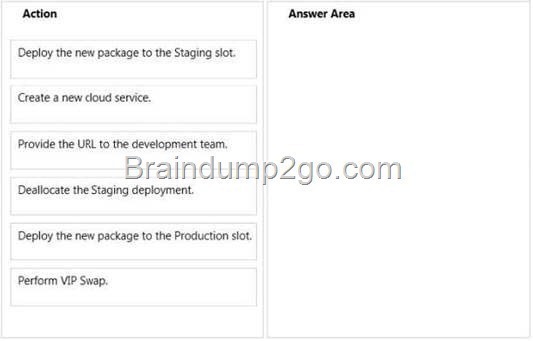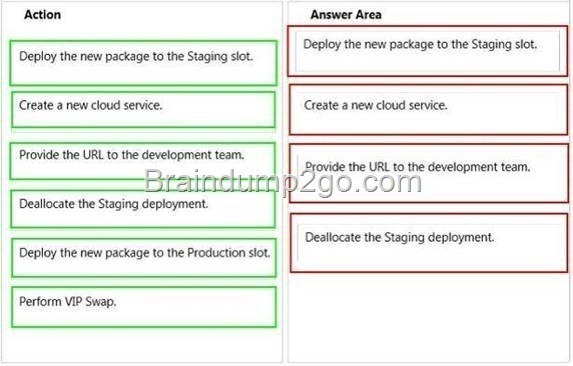QUESTION 1
You manage a cloud service that is running in two small instances. The cloud service hosts a help desk application. The application utilizes a virtual network connection to synchronize data to the company’s internal accounting system.
You need to reduce the amount of time required for data synchronization.
What should you do?
A. Configure the servers as large instances and re-deploy.
B. Increase the instance count to three.
C. Deploy the application to Azure Web Sites.
D. Increase the processors allocated to the instances.
Answer: A
Explanation:
http://msdn.microsoft.com/en-us/library/azure/dn197896.aspx
QUESTION 2
You manage a cloud service that has a web application named WebRole1.
WebRole1 writes error messages to the Windows Event Log.
Users report receiving an error page with the following message:
“Event 26 has occurred. Contact your system administrator.”
You need to access the WebRole1 event log.
Which three actions should you perform? Each correct answer presents part of the solution.
A. Enable verbose monitoring.
B. Update the WebRole1 web.config file.
C. Update the cloud service definition file and the service configuration file.
D. Run the Set-AzureVMDiagnosticsExtension PowerShell cmdlet.
E. Run the Enable-AzureWebsiteApplicationDiagnostic PowerShell cmdlet.
F. Create a storage account.
Answer: ABC
Explanation:
http://azure.microsoft.com/en-us/documentation/articles/cloud-services-howto-monitor/ http://msdn.microsoft.com/en-us/library/azure/ee758710.aspx http://msdn.microsoft.com/en-us/library/azure/ee758711.aspx
QUESTION 3
Drag and Drop Question
You manage an application hosted on cloud services. The development team creates a new version of the application.
The updated application has been packaged and stored in an Azure Storage account.
You have the following requirements:
– Deploy the latest version of the application to production with the least amount of downtime.
– Ensure that the updated application can be tested prior to deploying to the Production site,
– Ensure that the original version of the application can be restored until the new version is verified.
Which four steps should you perform in sequence? To answer, move the appropriate actions from the list of actions to the answer area and arrange them in the correct order.

Answer:

QUESTION 4
You manage a cloud service that utilizes data encryption.
You need to ensure that the certificate used to encrypt data can be accessed by the cloud service application.
What should you do?
A. Upload the certificate referenced in the application package.
B. Deploy the certificate as part of the application package.
C. Upload the certificate’s public key referenced in the application package.
D. Use RDP to install the certificate.
Answer: A
Explanation:
http://msdn.microsoft.com/en-us/library/azure/gg981929.aspx
QUESTION 5
You administer a Windows Server virtual machine (VM).
You upload the VM to Azure.
You need to ensure that you are able to deploy the BGInfo and VMAccess extensions.
What should you do?
A. Select the Install the VM Agent checkbox while provisioning a VM based on your uploaded VHD.
B. Select the Enable the VM Extensions checkbox while provisioning a VM based on your uploaded VHD.
C. Install the VM Agent MSI and execute the following Power Shell commands:
$vm = Get-AzureVM – serviceName $svc -Name $name
$vm.VM.ProvisionGuestAgent = $true Update-AzureVM -Name Sname -VM
$vm.VM -ServiceName $svc
D. Install the VM Agent MSI and execute the following Power Shell commands:
$vm = Get-AzureVM – serviceName $svc -Name $name Set-AzureVMBGInfoExtension -VM
$vm.VM Set-AzureVM Access Extension -VM
$vm.VM Update-AzureVM -Name Sname -VM $vm.VM -ServiceName $svc
Answer: A
Explanation:
http://msdn.microsoft.com/en-us/library/azure/dn606311.aspx
QUESTION 6
You manage a cloud service that supports features hosted by two instances of an Azure virtual machine (VM).
You discover that occasional outages cause your service to fail.
You need to minimize the impact of outages to your cloud service.
Which two actions should you perform? Each correct answer presents part of the solution.
A. Deploy a third instance of the VM.
B. Configure Load Balancing on the VMs.
C. Redeploy the VMs to belong to an Affinity Group.
D. Configure the VMs to belong to an Availability Set.
Answer: CD
Explanation:
http://msdn.microsoft.com/en-us/library/hh973190.aspx
http://msdn.microsoft.com/en-us/library/azure/dn569263.aspx
QUESTION 7
Hotspot Question
You manage an Azure Service Bus for your company.
You plan to enable access to the Azure Service Bus for an application named ContosoLOB.
You need to create a new shared access policy for subscriptions and queues that has the following requirements:
– Receives messages from a queue
– Deadletters a message
– Defers a message for later retrieval
– Enumerates subscriptions
– Gets subscription description
In the table below, identify the permission you need to assign to ensure that ContosoLOB is able to accomplish the above requirements. Make only one selection in each column.
![clip_image002[4]_thumb_thumb_thumb_thumb_thumb_thumb_thumb_thumb_thumb_thumb_thumb clip_image002[4]_thumb_thumb_thumb_thumb_thumb_thumb_thumb_thumb_thumb_thumb_thumb](http://examgod.com/l2pimages/68cbf8d0228d_9560/clip_image0024_thumb_thumb_thumb_thumb_thumb_thumb_thumb_thumb_thumb_thumb_thumb_thumb.jpg)
Answer:
![clip_image001[4]_thumb_thumb_thumb_thumb_thumb_thumb_thumb_thumb_thumb_thumb_thumb clip_image001[4]_thumb_thumb_thumb_thumb_thumb_thumb_thumb_thumb_thumb_thumb_thumb](http://examgod.com/l2pimages/68cbf8d0228d_9560/clip_image0014_thumb_thumb_thumb_thumb_thumb_thumb_thumb_thumb_thumb_thumb_thumb_thumb.jpg)
QUESTION 8
Your network includes a legacy application named LegacyApp1.
The application only runs in the Microsoft .NET 3.5 Framework on Windows Server 2008.
You plan to deploy to Azure Cloud Services.
You need to ensure that LegacyApp1 will run correctly in the new environment. What are two possible ways to achieve this goal? Each correct answer presents a complete solution.
A. Upload a VHD with Windows Server 2008 installed.
B. Deploy LegacyApp1 to a cloud service instance configured with Guest OS Family 2.
C. Deploy LegacyApp1 to a cloud service instance configured with Guest OS Family 1.
D. Deploy LegacyApp1 to a cloud service instance configured with Guest OS Family 3.
Answer: BC
Explanation:
Guest OS Family 1 and Guest OS Family 2 supports .NET 3.5 and .Net 4.0. Guest OS Family 3 and Guest OS Family 4 supports .NET 4.0 and .Net 4.5.
http://msdn.microsoft.com/en-us/library/azure/ee924680.aspx
QUESTION 9
Drag and Drop Question
You administer a cloud service named contosoapp that has a web role and worker role. Contosoapp requires you to perform an in-place upgrade to the service.
You need to ensure that at least six worker role instances and eight web role instances are available when you apply upgrades to the service.
You also need to ensure that updates are completed for all instances by using the least amount of time.
Which value should you use with each configuration? To answer, drag the appropriate value to the correct configuration. Each value may be used once, more than once, or not at all. You may need to drag the split bar between panes or scroll to view content.
![clip_image001[6]_thumb_thumb_thumb_thumb_thumb_thumb_thumb_thumb_thumb_thumb_thumb clip_image001[6]_thumb_thumb_thumb_thumb_thumb_thumb_thumb_thumb_thumb_thumb_thumb](http://examgod.com/l2pimages/68cbf8d0228d_9560/clip_image0016_thumb_thumb_thumb_thumb_thumb_thumb_thumb_thumb_thumb_thumb_thumb_thumb.jpg)
Answer:
![clip_image001[8]_thumb_thumb_thumb_thumb_thumb_thumb_thumb_thumb_thumb_thumb_thumb clip_image001[8]_thumb_thumb_thumb_thumb_thumb_thumb_thumb_thumb_thumb_thumb_thumb](http://examgod.com/l2pimages/68cbf8d0228d_9560/clip_image0018_thumb_thumb_thumb_thumb_thumb_thumb_thumb_thumb_thumb_thumb_thumb_thumb.jpg)
QUESTION 10
You migrate a Windows Server .NET web application to Azure Cloud Services.
You need enable trace logging for the application.
Which two actions should you perform? Each correct answer presents part of the solution.
A. Update the service definition file.
B. Update the Azure diagnostics configuration.
C. Update the service configuration file.
D. Enable verbose monitoring.
E. Update the application web.config file.
Answer: AB
Explanation:
http://msdn.microsoft.com/en-us/library/azure/ee758711.aspx
http://msdn.microsoft.com/en- us/magazine/ff714589.aspx
Braindump2go New Released Microsoft 70-533 Dump PDF Free Dobwload, 112 Questions in all, Passing Your Exam 100% Easily! http://www.braindump2go.com/70-533.html